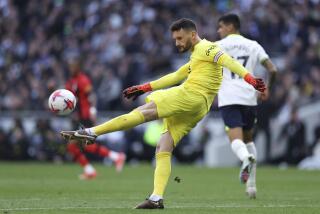For a While, Lafleur Was in the Fast Lane
- Share via
MONTREAL — A near-fatal car crash four years ago persuaded Montreal Canadien superstar Guy Lafleur to curb his penchant for the high-rolling night life of downtown bars.
The recently retired Lafleur told United Press International this week that he frequently partied with his hockey teammates during a period of six years, including the National Hockey League club’s glory years of 1975-79, when they won four Stanley Cups.
“I went out almost every night with the guys on the team between 1975 and 1981,” Lafleur, 33, said. “We were winning in those years. It was fun.
“I felt obliged to go out with the guys on the team. They were friends. I didn’t want a barrier. It brought us closer.
“People at Thursday’s (bar) and other bars were happy to see us.”
After a night of downtown dining and drinking with then-teammate Robert Picard, Lafleur fell asleep behind the wheel of his Cadillac on his way home in the early morning of March 25, 1981.
The car plunged off the highway and into a metal post that shattered the windshield and sliced part of Lafleur’s right ear.
Irving Grundman, Canadien general manager at the time, described his star’s brush with death as “a second birthday; the luckiest day of his life.”
“I decided to slow down after that,” Lafleur said. “I realized that my family was more important to me than downtown night life.
“The night crowd doesn’t give a bleep as long as you bring the money in. When trouble comes, it’s your family that supports you.”
Lafleur’s wife, Lise, comes from a well-to-do Quebec City family. They have two sons--Martin, 10 years old, and Mark, three months old.
Lafleur also liked fast cars and motorcycles during that period. One night in 1978 he covered the 150-mile voyage between Montreal and Quebec City in 55 minutes, reaching speeds of 177 m.p.h. in his Ferrari.
“It’s my nature,” he said. “I always liked speed.”
But the 1980-81 season proved to be a slow one for Lafleur. It marked the beginning of the end for him as the last in a long line of French-Canadian superstars with one of the most illustrious teams in NHL history.
After six consecutive seasons of at least 50 goals and six times as an NHL first-team all-star, Lafleur struggled through 1980-81.
Until the car accident, he had scored 26 goals and 40 assists in 49 games. He had missed 25 games due to injury. He ended the 1980-81 season with 27 goals.
He never again scored more than 30 goals per season until his retirement last November.
Although the partying “didn’t do my career any good,” Lafleur said it wasn’t the main reason for his hockey demise.
Adding to the pressure in 1980-81, was a $165,000 back-tax assessment he was ordered to pay by the federal and provincial governments. There were also nagging injuries and tonsillitis.
“Mentally, it affected my play. They (outside pressures) disturbed me.”
Lafleur, a heavy smoker throughout his career, said the greatest pressure was performing in a hockey mecca where the fans expect Stanley Cups and scoring championships on a regular basis.
“When I first came to Montreal (1971), I had a lot of pressure,” he said. “People were talking about me as a replacement for (Canadiens’ Hall of Fame center ) Jean Beliveau. You don’t replace a man like that.
“The fans and journalists here always expected a Stanley Cup. They don’t want you to slip from year to year. If you score 60 goals one year and 55 the next, it isn’t considered good.”
As he pushed to regain his scoring touch, Lafleur found himself out of place on a team which was beginning to stress defensive strategy.
“It wasn’t fun any more,” he said of the last few seasons. “I tried so hard, I made more gaffes. In the NHL, 95 percent of success is confidence.
“When the fans chanted: ‘Guy, Guy,’ I knew they were behind me. I wanted to retire with them behind me. I was afraid they would turn against me if I continued to play poorly.”
Although he is happy working in public relations for the Canadiens at $500,000 a year, Lafleur believes he could still be a big goal scorer with the right NHL team.
When asked how he would fit in with the fast-skating, high-scoring Edmonton Oilers, he said: “They would be beautiful years from the point of view of goals. The Oilers’ style is more up my alley.”
More to Read
Go beyond the scoreboard
Get the latest on L.A.'s teams in the daily Sports Report newsletter.
You may occasionally receive promotional content from the Los Angeles Times.






